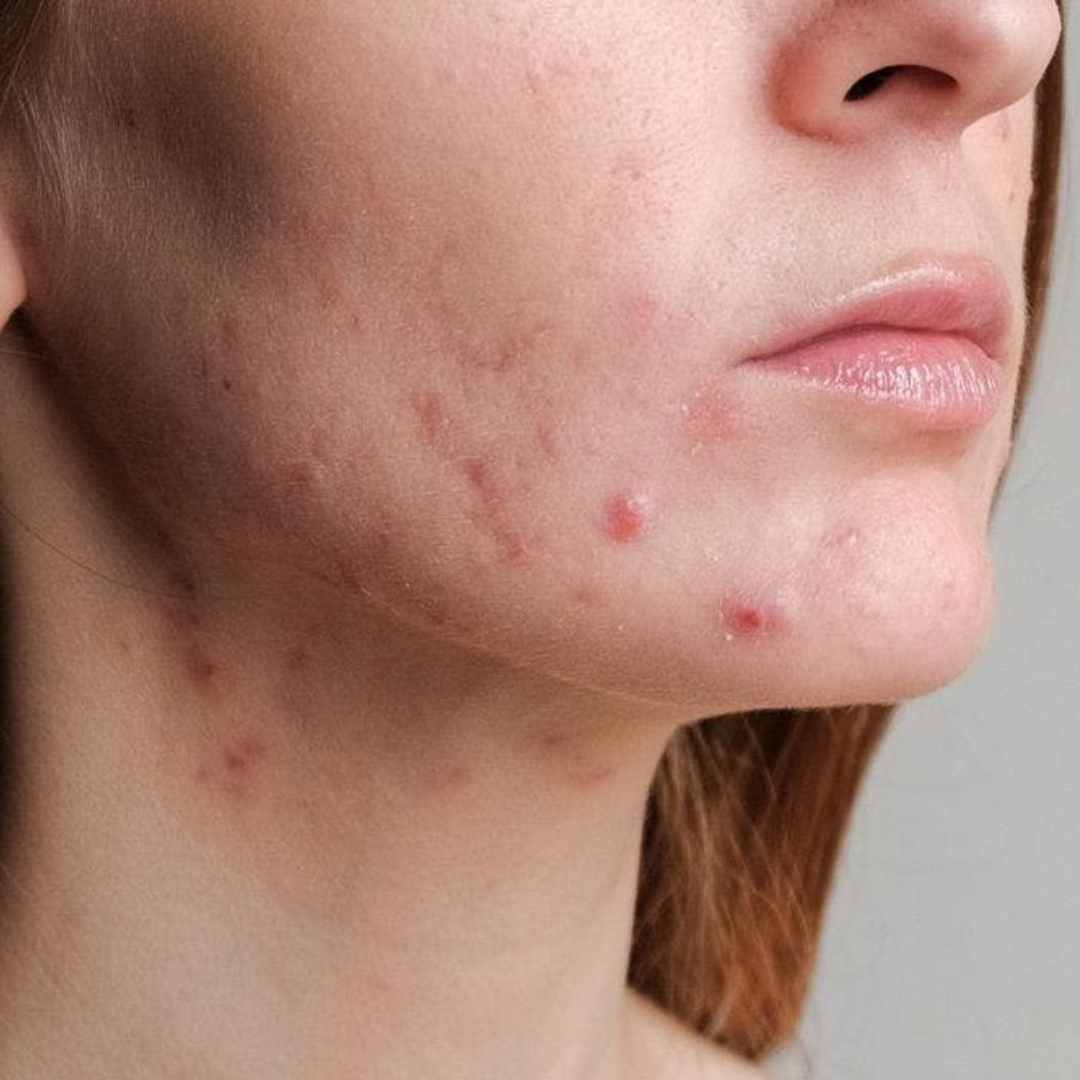
How can I tell if it's hormonal acne?
Share
Acne is a skin problem that affects millions of people worldwide, and not just teenagers. In adult adult womenit's common to experience an acne flare-ups often linked to female hormones. female hormones. If you notice red spotspimples microcysts or blackheads mainly around the jawline and chin, you could be dealing with hormonal acne. But how can you recognize hormonal acne and distinguish its causes and treatments? Here's everything you need to know to identify and treat this particular form of acne.
What is hormonal acne?
Hormonal acne is a form of acne linked to the production of production of hormones such as androgens. These hormones stimulate the sebaceous glandsglands, leading to overproduction of sebum. This sebum production production clogs skin porescreating blackheadsblackheads papules or even pustules.
This form of acne mainly affects women between the ages of 20 and 40 yearsalthough it can appear at any time during adulthood. adulthood. In contrast to teenage acnelesions are often deeper and more painful, and tend to be located in the U-shaped area of the face: jawline, chin and lower cheeks.

How to recognize hormonal acne?
Here are a few characteristics that help differentiate hormonal acne from other types of acne:
-
Location Acne hormonal acne usually appear on the chin, jawline and sometimes the neck.
-
Menstrual cycle If your acne flare-ups coincide with your menstrual cyclethis may be a sign of hormonal imbalance.
-
Type of lesions Lesions are often inflammatory : nodules, papules, cysts under the skin.
-
Oily skin Oily skin oily skin or seborrhea with excess sebum may be an indicator of hyperstimulation of the sebaceous glands.
-
Duration Unlike a simple acne flare-up, hormonal acne can persist for years without appropriate treatment.
Causes of hormonal acne
Hormonal acne is often the result of fluctuating sex hormones. Here are the main causes:
-
Menstrual cycle Variations in estrogen and progesterone levels prior to menstruation often lead to acne flare-ups.
-
Hormonal contraceptives Some contraceptive pills can aggravate acne or, on the contrary, help regulate the hormones.
-
Pregnancy Hormonal fluctuations during pregnancy modify sebum production. sebum production.
-
Polycystic ovary syndrome (PCOS) This condition is frequently associated with persistent acne acne.
-
Stress : Stress stimulates the release of cortisol, which can disrupt the hormones and lead to proliferation of bacteria responsible for acne.
Solutions to fight hormonal acne
1. Adopt an appropriate skincare routine
A skincare routine routine can make all the difference. Here are the essential steps:
-
Mild cleaner Use a cleansing gel or a micellar water to purify the skin without aggressing it.
-
Exfoliation An exfoliant based onsalicylic acid orglycolic acid helps unclog pores and reduce blackheads.
-
Hydration Opt for a moisturizing non comedogenic moisturizer to maintain the skin's skin balance.
-
Local treatments Active ingredients such as benzoyl peroxideand retinoids or essential oils such as tea tree can reduce lesions.
-
Sun protection Use sunscreen to prevent acne scarring acne scars.
2. Consult a dermatologist
For moderate to severe cases, a dermatologist may prescribe drug treatments such as :
-
Oral treatments The contraceptive pilloral antibiotics or drugs such as Roaccutane (isotretinoin) may be considered.
-
Topical treatments : Creams based on retinoidsand benzoyl peroxide orazelaic acid are effective against inflammatory flare-ups.
-
Chemical peel Chemical peels basedacids help exfoliate skin skin.
3. Adapt your lifestyle
-
Diet Limit dairy dairy products and foods with a glycemic glycemic index (sugars, pastries), which can aggravatehormonal acne.
-
Stress management : Practice relaxing activities such as yoga or meditation to balance hormones.
-
Sleep Get enough sleep to promote skin regeneration.
4. Use natural remedies
Certain plants and essential oils can be very effective:
-
Lavender essential oil or tea tree They have antiseptic and soothing properties.
-
Green clay Ideal for absorbingexcess sebum and purify the skin.
-
Aloe vera Moisturizes and soothes redness redness.
-
Zinc This dietary supplement is known for its anti-inflammatory and sebum regulating properties. sebum production.
Mistakes to avoid
To avoid aggravate your hormonal acneavoid :
-
Aggressive products : Cleansers that are too abrasive can cause excessive dryness and stimulate sebum secretion. sebum secretion.
-
Too much make-up Comedogenic make-up clogs pores, leaving them pores.
-
Button handling : Pierce the red buttons or microcysts increases the risk of acne scars.
When should you consult a professional?
If your hormonal acne is severe or resistant to home treatments, it is essential to consult a dermatologist. He or she can perform a check-up to evaluate your hormones and prescribe a acne treatment sometimes in collaboration with a gynecologist.
Conclusion
Hormonal acnealthough frustrating, can be treated with a combination of dermatological care, lifestyle changes and sometimes medical treatment. By identifying its signs as acne flare-ups around the menstrual cycleor painful or oily oily skinyou can better target your efforts to regain healthy skin and avoid scars. A global approach, combining skincare routine and adapted treatments, is the key to hormonal acne effectively.

